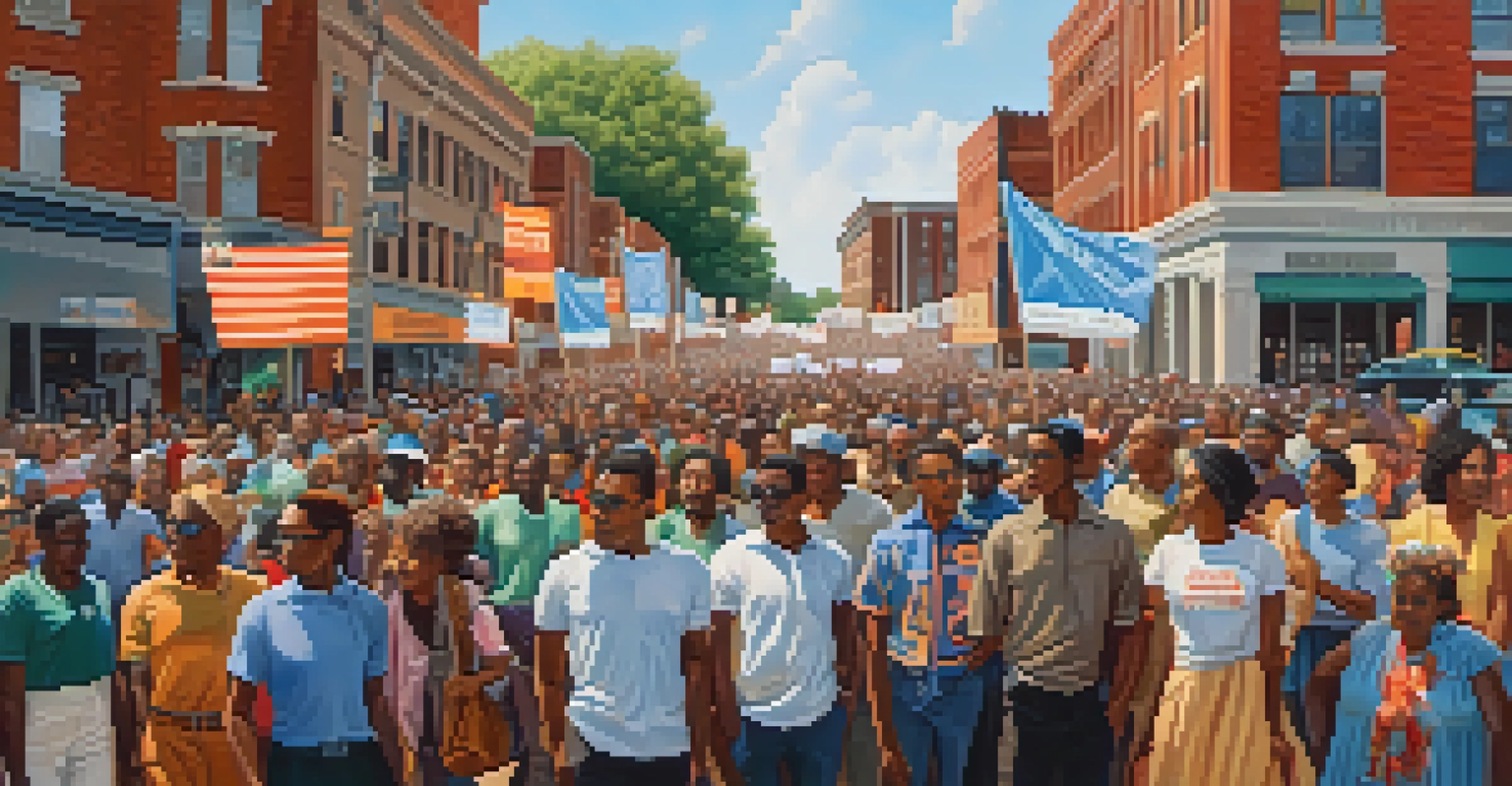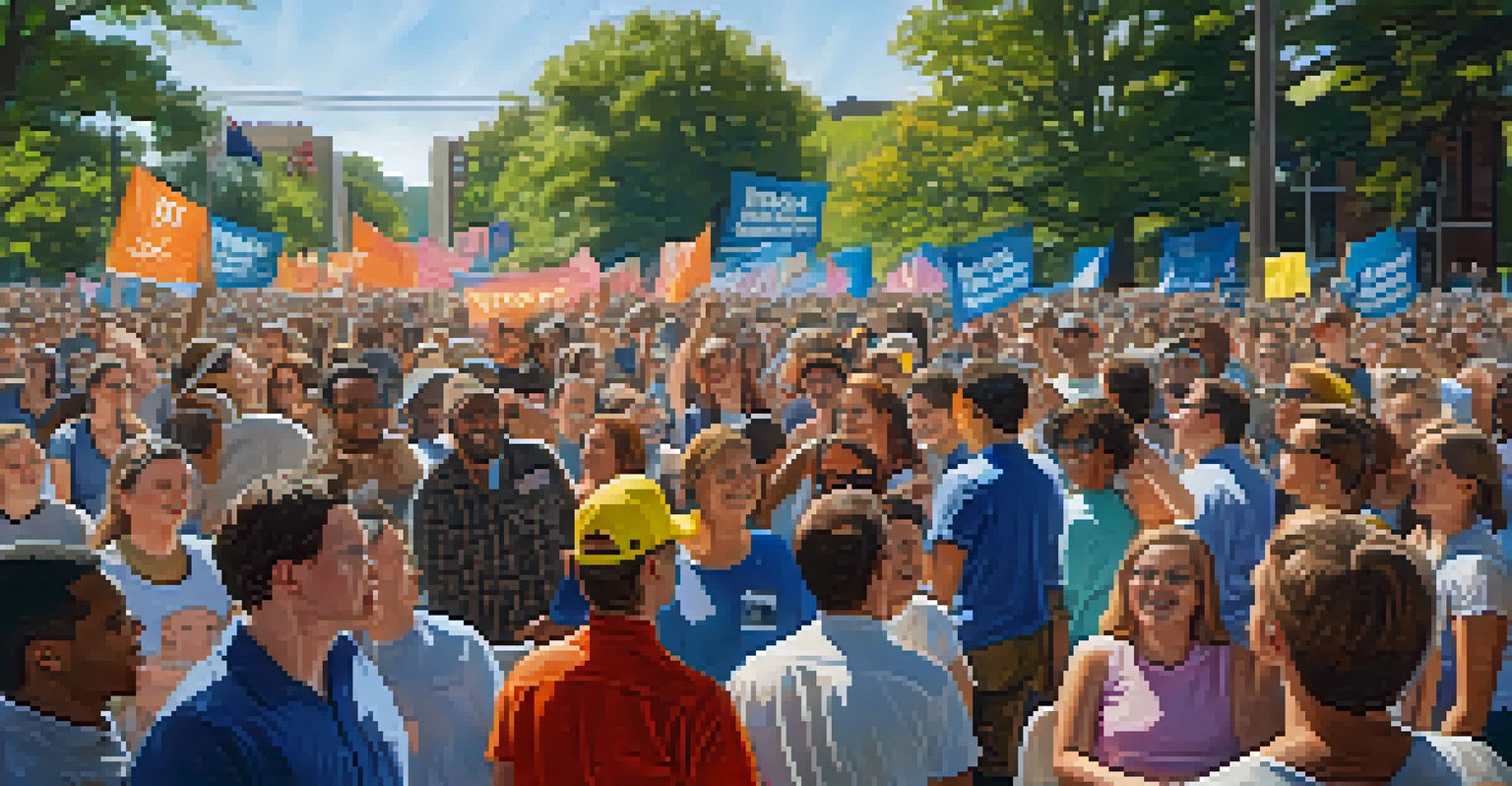The Evolution of North Carolina's Political Landscape

Early Political Foundations: Colonial to Revolutionary Era
North Carolina's political landscape began taking shape in the colonial era, marked by a mix of English settlers and indigenous communities. This blend of cultures set the stage for unique governance challenges, as local leaders struggled to balance colonial interests with the needs of their constituents. The Revolutionary War further solidified political identities as North Carolinians rallied against British rule, fostering a sense of unity and independence.
Injustice anywhere is a threat to justice everywhere.
As the colonies moved toward independence, North Carolinians played a crucial role in the Continental Congress and the drafting of the Declaration of Independence. Figures like Richard Caswell emerged as influential leaders, advocating for a democratic government that represented the will of the people. This era laid the groundwork for the state's future political development, emphasizing a commitment to self-governance.
The revolutionary fervor also sparked debates over governance styles, with debates on federalism versus states' rights becoming prominent. This tension would echo throughout North Carolina's political evolution, influencing its alignment with various national movements in the years to come.
The Antebellum Period: Slavery and Political Divisions
As North Carolina entered the antebellum period, the issue of slavery became a significant dividing line in its political landscape. The state’s economy heavily relied on agriculture, particularly tobacco and cotton, which depended on slave labor. This reliance created stark divisions between northern and southern regions, with the latter often resisting abolitionist sentiments.

Political factions began to emerge, with the Democratic Party aligning closely with pro-slavery interests, while the Whig Party attracted those who were more moderate or opposed to the expansion of slavery. This division fueled political tensions and set the stage for deep-rooted conflicts that would shape the state’s future. It was a time when political allegiances were not just about party affiliation but also personal and moral beliefs.
Colonial Foundations of Governance
North Carolina's political identity began to form during the colonial era, influenced by both English settlers and indigenous communities.
The 1860 election of Abraham Lincoln, perceived as a threat to the institution of slavery, led North Carolina to secede from the Union. This drastic shift not only altered the political landscape but also thrust the state into the chaos of the Civil War, forever changing its governance and societal structures.
Reconstruction: A Struggle for Political Power
The end of the Civil War ushered in the Reconstruction era, a time of significant political upheaval in North Carolina. With the Union victory, newly freed African Americans sought to participate in the political process, leading to the establishment of the Republican Party as a powerful force. This shift represented a dramatic change in the political dynamics of the state, as former slaves began to secure political positions.
The arc of the moral universe is long, but it bends toward justice.
However, this newfound power was met with fierce resistance from white supremacists and former Confederates. Groups like the Ku Klux Klan emerged, aiming to undermine African American political power through intimidation and violence. The struggle for political representation became a battleground for differing visions of democracy and governance.
Despite these challenges, the Reconstruction period saw advancements in civil rights and education for African Americans. However, the eventual withdrawal of federal troops and the rise of Jim Crow laws would soon reverse many of these gains, leading to a long period of disenfranchisement and political marginalization.
The Jim Crow Era: Suppression and Resistance
The Jim Crow era marked a dark chapter in North Carolina's political history, characterized by racial segregation and the systematic suppression of African American voters. Laws were enacted to disenfranchise black citizens, including literacy tests and poll taxes, which effectively barred them from participating in elections. This institutionalized racism created a political landscape dominated by white Democrats who maintained power through oppressive measures.
During this time, grassroots movements emerged as a response to the injustices faced by African Americans. Organizations like the NAACP began to advocate for civil rights and challenge discriminatory laws, planting the seeds for future political change. These activists faced immense challenges but remained determined to fight for equality and representation.
Civil Rights Movement Impact
The Civil Rights Movement of the 1960s significantly reshaped North Carolina's political landscape, empowering African Americans and redefining party loyalties.
The resilience of these movements would eventually pave the way for the Civil Rights Movement in the mid-20th century, sparking a renewed struggle for political power and social justice. The fight against Jim Crow laws was not just about voting rights but also about reclaiming dignity and identity within the political sphere.
Civil Rights Movement: Political Awakening and Change
The Civil Rights Movement of the 1960s was a pivotal moment in North Carolina's political evolution, as activists mobilized to challenge systemic racism and fight for voting rights. Events like the Greensboro sit-ins in 1960 showcased the power of nonviolent protest, capturing national attention and highlighting the urgency of the struggle for equality. These actions galvanized support for civil rights legislation and shifted public opinion.
As African Americans began to regain their political power, the Democratic Party faced internal divisions over civil rights, leading to a realignment of political loyalties. The passage of the Voting Rights Act in 1965 was a significant victory, allowing black citizens to register and vote without facing discriminatory barriers. This marked a turning point, as North Carolina saw a surge in black political representation.
In addition to the Democratic Party, new voices began to emerge in the political landscape. The rise of independent and third-party movements reflected a growing desire for diverse representation and accountability. This period of awakening laid the groundwork for future generations to continue the fight for equality and justice in the political arena.
The Modern Era: Polarization and New Political Dynamics
In recent decades, North Carolina's political landscape has become increasingly polarized, reflecting broader national trends. The state has emerged as a battleground for both Democrats and Republicans, with key elections often decided by razor-thin margins. This shift has prompted intense campaigning and strategic outreach efforts from both parties, as they vie for the support of a diverse electorate.
Issues like immigration, education, and healthcare have taken center stage in political debates, influencing voter sentiments and party platforms. The rise of social media has also changed the way candidates engage with constituents, allowing for more direct communication but also fostering divisive rhetoric. As political identities become more entrenched, finding common ground has become more challenging.
Modern Political Polarization
North Carolina has become increasingly polarized in recent decades, reflecting national trends and resulting in intense competition between political parties.
Despite these challenges, grassroots movements continue to thrive, advocating for issues like environmental protection and social justice. The presence of young and diverse voters is reshaping the political landscape, pushing for progressive change and accountability. This dynamic environment suggests that North Carolina's political evolution is far from over, with new voices and perspectives shaping its future.
Looking Ahead: The Future of North Carolina's Politics
As we look to the future, North Carolina's political landscape is poised for further transformation. Trends indicate an increasing engagement among younger voters, who are more likely to prioritize issues like climate change, healthcare accessibility, and racial equity. This shift could lead to a reimagining of party platforms and priorities, as candidates respond to the evolving needs of their constituents.
Moreover, the ongoing demographic changes in North Carolina, with a growing population of immigrants and diverse communities, are likely to influence political dynamics. The challenges of representation and inclusivity will remain crucial as these communities seek to make their voices heard in the political sphere. Understanding and addressing these needs will be essential for any party hoping to gain traction in upcoming elections.

Ultimately, the evolution of North Carolina's political landscape over the years underscores the importance of civic engagement and the power of collective action. As history has shown, the future is shaped by those who actively participate in it, making it more vital than ever for citizens to stay informed and involved in the political process. The journey ahead may be complex, but it offers an opportunity for growth and progress in the pursuit of a more equitable society.